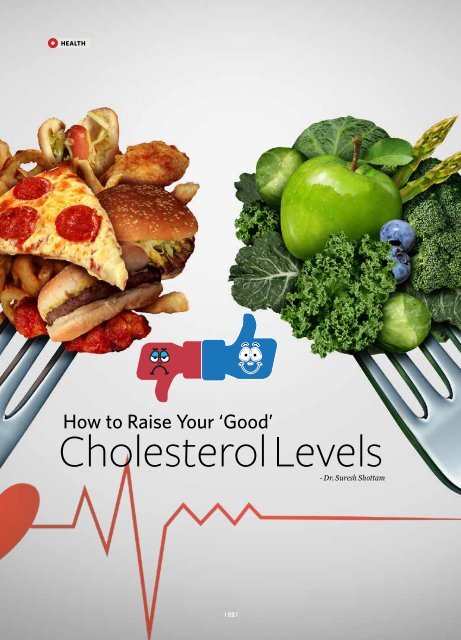BUZZOYO November 2019
You also want an ePaper? Increase the reach of your titles
YUMPU automatically turns print PDFs into web optimized ePapers that Google loves.
HEALTH<br />
<strong>BUZZOYO</strong> NOV <strong>2019</strong><br />
While cholesterol is a complex substance, most of us are familiar with two of its primary<br />
components: LDL (bad cholesterol) and HDL (good cholesterol).<br />
So far, both doctors and their patients have focused on reducing LDL cholesterol as a key part of<br />
their treatment regimen. However, new research at Baylor College of Medicine shows that having<br />
too little HDL cholesterol may be more damaging and may even be more predictive of<br />
heart disease than LDL.<br />
“Even if their total cholesterol and LDL levels are normal,<br />
people with reduced levels of HDL have an increased risk<br />
of early coronary artery disease,”<br />
says Richard N. Fogoros, M.D.<br />
SOME GOOD NEWS<br />
Even a slight increase in HDL goes a long way.<br />
It’s estimated that for every 1 mg/dl increase in HDL<br />
cholesterol, there is a 2% to 4% decrease in your risk of<br />
coronary heart disease.<br />
How to Raise Your ‘Good’<br />
Cholesterol Levels<br />
- Dr. Suresh Shottam<br />
Should you use drugs to raise HDL cholesterol?<br />
Drug therapy has been less successful at raising HDL<br />
than at reducing LDL cholesterol. Statins in particular,<br />
are often quite poor at increasing HDL levels. While<br />
some newer statins may increase HDL, these drugs<br />
might not be good for people whose LDL cholesterol<br />
and total cholesterol levels are normal because, while<br />
raising the HDL, the drug will lower normal LDL and<br />
total cholesterol levels.<br />
Before resorting to drugs, first try these proven,<br />
natural methods…<br />
Exercise:<br />
Aerobic exercise and strength training can<br />
increase your HDL if done correctly and regularly.<br />
Maintain optimal body weight:<br />
Obesity can increase LDL cholesterol levels while<br />
reducing HDL. Losing weight can help<br />
increase HDL.<br />
Don’t eat ‘trans fats’:<br />
Avoid these unhealthy, artery-clogging fats found<br />
in margarine, vegetable shortening, fried foods like<br />
French fries and fried chicken, doughnuts, cookies,<br />
pastries and crackers.<br />
Eat more monounsaturated fats:<br />
Increase intake of fats such as olive oil, homemade<br />
peanut butter, avocados, etc.<br />
Eat soluble fiber:<br />
Found in apples, oranges, berries, seeds, nuts, oat<br />
bran, vegetables, etc.<br />
Reduce refined carbohydrates:<br />
Like white sugar, white flour and white rice.<br />
Feast on raw onions:<br />
Half a raw onion a day may raise HDL levels by as<br />
much as 30%.<br />
Alcohol:<br />
One or two drinks a day may help to increase HDL<br />
levels. An ideal choice is red wine which is rich<br />
in antioxidants.<br />
WARNING:<br />
More than one or two drinks will do more harm than<br />
good. Be smart about alcohol…if the shoe doesn’t fit,<br />
don’t wear it!<br />
Do NOT go on an ultra low-fat diet:<br />
Too little fat can be as bad as too much fat in<br />
your diet (by creating a deficiency in essential<br />
fatty acids). Low-fat diets have been linked to<br />
significant reductions in HDL cholesterol. For best<br />
results, eat a variety of healthy fats and avoid the<br />
bad ones like ‘trans fats’.<br />
Quit smoking:<br />
This will increase your HDL levels.<br />
Consider taking niacin:<br />
Several studies have found that niacin (vitamin<br />
B3) can increase HDL by 30% while lowering total<br />
cholesterol by 10% to 25%.<br />
Get lots of omega-3:<br />
This essential fatty acid, found in fish, flaxseed<br />
and walnuts, can dramatically increase<br />
HDL cholesterol.<br />
Increase your HDL levels by using some or all of<br />
the above methods. Strive for a HDL level above<br />
60.<br />
| 52 |<br />
| 53 |




